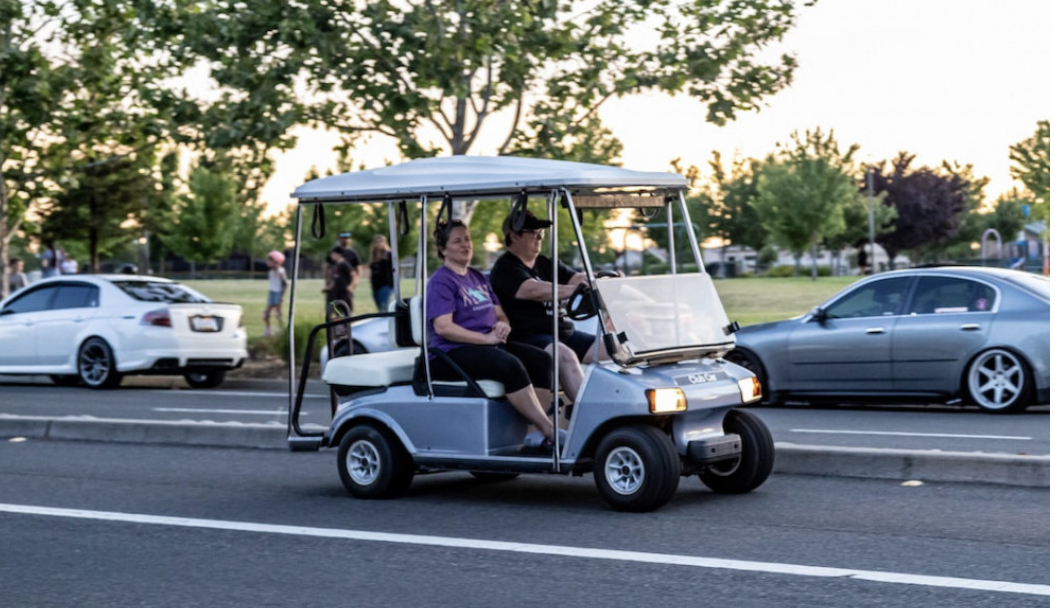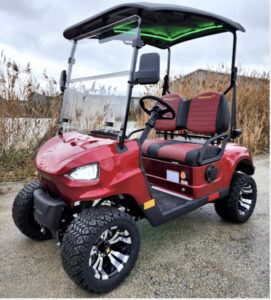
Wondering, can you drive a golf cart on the road with all the new electric and gas powered options like bikes, mopeds, scooters, etc.? The answer isn’t as straightforward as you might think.
While golf carts offer a convenient and eco-friendly way to get around, their use on public roads is subject to a complex web of regulations that vary from one jurisdiction to another. In some areas, it is permitted to drive a golf cart on certain roads under specific conditions, while in others, it may be prohibited entirely.
Typically, golf carts are designed for off-road or recreational use within golf courses and private property. They are not built to meet the safety standards required for regular road use, such as headlights, taillights, turn signals and other features found in conventional vehicles.
However, in some regions, there are exceptions and provisions that allow limited use of golf carts on public roads. These exceptions may include designated golf cart lanes, low-speed vehicle (LSV) classifications, or specific permits and licenses. Additionally, there may be restrictions on the maximum speed, hours of operation and road types where golf carts are allowed.
To determine the rules specific to your location, it is best to consult the local department of motor vehicles, transportation authority, or law enforcement agency. They will have the most accurate and up-to-date information regarding the regulations governing the use of golf carts on public roads in your area.
What Makes a Golf Cart Street Legal
To make a golf cart street legal, certain modifications and additions need to be made to meet the requirements set by local laws and regulations.
While the specific requirements may vary depending on the jurisdiction, here are some common features and modifications necessary to make a golf cart street legal:
Safety Equipment: Golf carts typically need to be equipped with safety features such as headlights, taillights, brake lights, turn signals, and reflectors to ensure visibility on the road.
Mirrors: Side and rear-view mirrors are often required to enhance the driver’s visibility and allow them to monitor surrounding traffic.
Windshield and Windshield Wipers: A windshield is typically needed to protect the driver and passengers from wind and debris, and windshield wipers may be required for visibility during rain or inclement weather.
Horn: A functioning horn or warning device is often necessary to alert pedestrians and other vehicles.
Seat Belts: Depending on the jurisdiction, seat belts may be required to ensure the safety of the occupants.
Speed Limitations: Golf carts may need to be equipped with speed-limiting devices, like a speed governor, to restrict their maximum speed to comply with the regulations.
Vehicle Identification Number (VIN): Some areas may require golf carts to have a unique VIN, similar to conventional vehicles, for identification and registration purposes.
Registration and Insurance: Street-legal golf carts may need to be registered with the local department of motor vehicles and carry appropriate insurance coverage.
Driver’s License and Age Requirements: Certain jurisdictions may require the driver of a street-legal golf cart to have a valid driver’s license and meet a minimum age requirement.
Tires and Wheels: Ensure that your golf cart has appropriate tires and wheels for road use. Street-legal golf carts usually require DOT-approved tires suitable for paved surfaces.
License Plate Bracket: Install a license plate bracket to affix the registration plate as required by local authorities.
Rear Seat Kit: If you plan to carry additional passengers, you may need to install a rear seat kit that meets safety standards and provides adequate seating and support.
Compliance with Emissions Standards: In some areas, golf carts may need to meet certain emissions standards to be street legal. Ensure that your cart complies with any applicable regulations in this regard.
It’s important to note that these requirements can vary significantly depending on your location. To ensure compliance with local regulations, it is advisable to contact your local department of motor vehicles, transportation authority, or law enforcement agency for the specific requirements in your area.
Where Can A Golf Cart Be Driven On The Road In The United States

The specific regulations regarding where golf carts can be driven on the road in the United States can vary by state, county, and even municipality. Some common locations where golf carts may be permitted to operate on the road include:
Gated Communities and Retirement Communities: Many gated residential communities and retirement communities have private roads where golf carts are allowed for transportation within the community.
Low-Speed Vehicle (LSV) Zones: Some areas designate specific zones or areas where low-speed vehicles, including certain types of golf carts, are permitted to operate on public roads. LSV zones typically have speed restrictions and may require additional safety features on the golf carts.
Beach Towns and Resort Areas: Some coastal towns and resort areas allow golf carts on designated roads near the beach or within specific zones to cater to tourists and provide alternative transportation options.
College Campuses: Some college campuses permit the use of golf carts for transportation within their grounds.
Municipalities With Specific Ordinances: Certain cities, towns, or counties may have local ordinances that allow golf carts on certain roads or in designated areas. These ordinances can vary greatly, so it is important to check the specific regulations in the area of interest.
States That Allow Golf Carts To Be Driven On The Road
The regulations regarding the operation of golf carts on public roads can vary from state to state in the United States. While some states have specific laws and provisions allowing golf carts on certain roads, others may restrict their use to private property or designated areas.
The following states generally have laws or provisions permitting the use of golf carts on public roads, subject to certain conditions and restrictions:
- Arizona
- California
- Florida
- Georgia
- Kentucky
- Louisiana
- Maryland
- Michigan
- New Mexico
- North Carolina
- Ohio
- Oklahoma
- South Carolina
- Tennessee
- Texas
- Utah
- Virginia
- West Virginia
It’s important to note that within each state, there may be further variations in the specific requirements and restrictions for driving golf carts on public roads.
Conclusion
Golf carts, like many other non-traditional vehicles being introduced to road use, will have regulations that need to followed.
Golf carts can be a lot of fun and an effective use of transportation for short distances but safety and knowledge of local ordinances is of utmost importance.
It is crucial to understand that even if golf carts are allowed on certain roads or in specific areas, there may still be restrictions in place, such as speed limits, specific routes, and permitted hours of operation.
Additionally, some jurisdictions may require permits or special licenses for golf cart operation on public roads.
To get accurate and up-to-date information on where golf carts can be driven on the road in a particular location, it is recommended to consult the local department of motor vehicles, transportation authority, or law enforcement agency. They will have the most comprehensive knowledge of the specific regulations in your area.

Happy Carting!
Shop Road Ready Golf Carts

